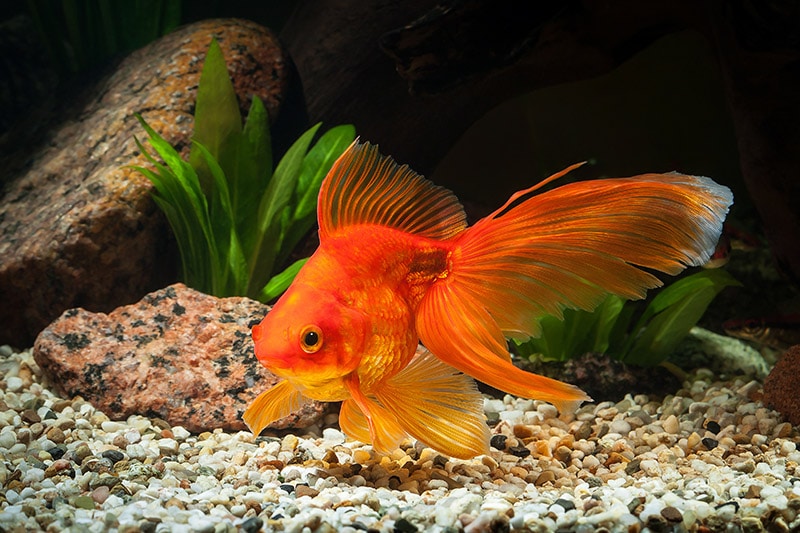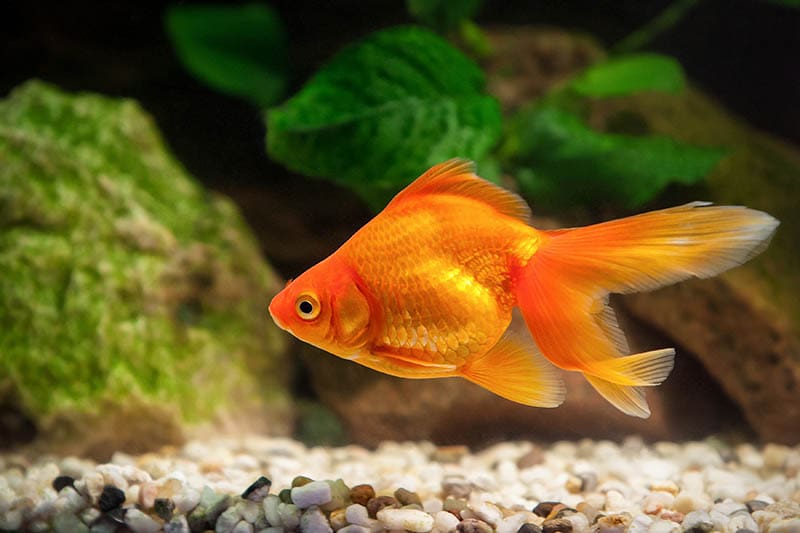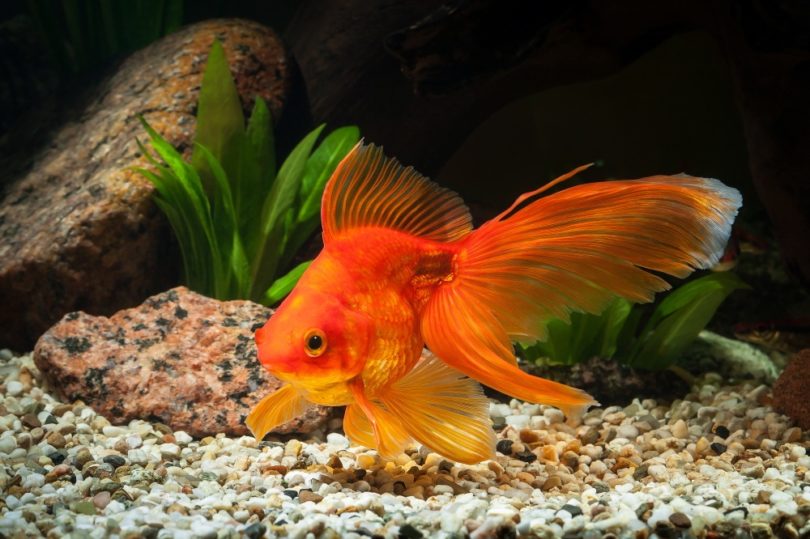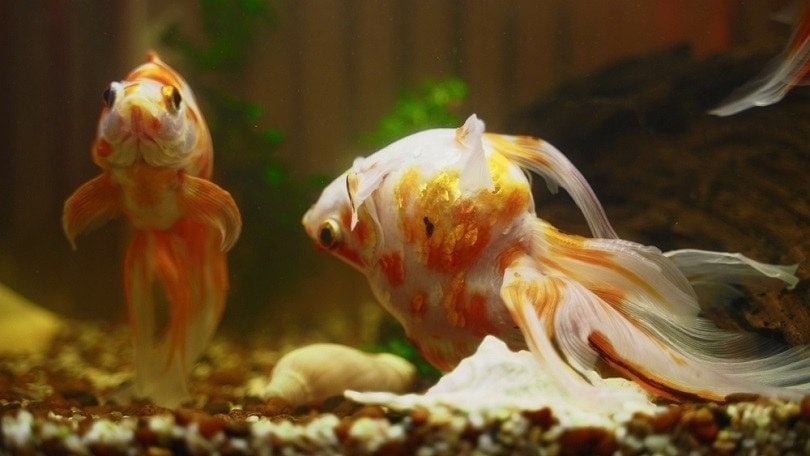How Long Do Goldfish Live? Average Lifespan, Data, & Care Guide
Updated on

Click to Skip Ahead
Goldfish (Carassius auratus) are popular pets with a history that stretches back to China’s Tsin Dynasty (265–419 AD). The species still exists in the wild, and The International Union for Conservation of Nature and Natural Resources (IUCN) lists them as a species of least concern. However, their wild counterpart is a far cry from the fish we keep. They are larger and drab-colored in comparison.
Fishkeeping has vastly improved from the sad days when people kept goldfish in small fish bowls. That’s a pivotal shift because it gave them a better quality of life and, consequently, a longer lifespan which can be up to 5-10 years.
Goldfish Average Lifespan
Life in captivity offers several advantages to goldfish. Food is readily available, with high-quality commercial products, predators aren’t a concern, and water conditions are relatively stable. These factors assume you’re providing ideal conditions and care for your pets, of course. Usually, animals fare better in captivity because of the reduced stress and pressures of life in the wild. However, that’s not always the case.
The average lifespan for pet goldfish is between 5–10 years. Tank size is a critical consideration. Wild fish live in the big, slow waters of streams, ponds, marshes, and lakes of eastern Asia. They typically swim in waters 3–65 feet deep. Conditions are stable without unhealthy fluctuations in water quality. Goldfish are somewhat tolerant, but there are limits. Food availability is another factor affecting their lifespan though.
How Long Do Goldfish Live in the Wild?
Wild goldfish usually live longer than their captive counterparts. The typical lifespan is 20–30 years, with an all-time record of 41 years. Space and food tip the pendulum in this direction. It’s worth noting the maximum longevity in captivity is 43 years. Goldfish can live long if their basic needs are met in a healthy environment. However, the population trend is unknown.

How to Care for Your Goldfish for a Long Lifespan
The fundamentals of ensuring a healthy pet and a long lifespan revolve primarily around water quality. That includes the filtration set-up in your tank or pond to maintain healthy water chemistry and the removal of waste products through the action of the nitrogen cycle. Therein lies the advantage of big water with its stable water conditions. Regular water changes can replicate these positive effects in captivity.
Feeding & Diet
Wild goldfish are opportunistic omnivores. Research has shown that vegetation makes up nearly half of their diet. Insects account for almost one-fourth. These findings aren’t surprising, given the species habitat. Both are likely abundant. Hobbyists typically offer their pets a commercial flake diet. The advantage is that they are nutritionally complete and easier to feed than plants and bugs. It also makes keeping the tank or pond clean easier. We recommend feeding your goldfish a product formulated for their species. Don’t be tempted to get an all-purpose food, as their nutritional needs vary from other fish.

Environment
The environment has two vital components: water quality and stocking level. The two go hand in hand. Keeping the water clean and healthy is more manageable if you don’t overstock your tank. Also important is the surface area where gas exchange takes place. Much anecdotal information exists about the ideal ratio of the tank to fish. Remember that goldfish are messier than tropical fish, and they need space.
The Bristol Aquarists’ Society of the United Kingdom has been around since 1929. We’ll trust their recommendation of “…24 square inches for each 1 inch of fish body length excluding the tail.” Overstocking your tank makes the water conditions less stable and more likely to reach unsafe levels. That means more work on your part and more stress on the fish.
- Nitrites: 0 ppm
- Nitrates: Under 15 ppm
- pH: 7.0–7.5
- General hardness (GH): 180 ppm or 10°
- Temperature: 60.8–71.6°F
Cleaning
Goldfish are a good starter fish because of their tolerance of less-than-ideal conditions. However, that’s not a license to be lax with tank maintenance. You should keep the aquarium topped up, replacing water as needed. You should do bimonthly water changes to dilute pollutants that can adversely affect water quality. Replacing 25% won’t stress your fish unduly.
We recommend using water at room temperature with a product to remove the chlorine. A siphon can remove debris in the substrate. You should also clean any structures in the tank and clean the algae off the glass.
Healthcare
Goldfish are resilient creatures. However, stress makes them vulnerable to disease and parasites. A loss of appetite and lethargy are red flags, as these fish are pretty active. Abnormalities of their scales are another troubling sign. Odd growth or fuzz on your goldfish is another indication of disease. If possible, you should quarantine the sick fish to prevent infecting the rest of your stock.
The 3 Life Stages of a Goldfish
Goldfish begin life as eggs laid by the female. They hatch within 72 hours, and then they grow quickly into fry. If they survive, they will develop into adults with sexual maturity. Conditions and diet will support healthy growth and development.

How to Tell Your Goldfish’s Age
Size is an excellent indicator of age, although environmental conditions and diet may influence how fast they grow. Fancy goldfish mature slower and don’t get as big. It may result from the loss of genetic diversity that has occurred with selective breeding and its subsequent loss of vitality.
| Age | Slim-bodied Goldfish Size | Fancy Goldfish Size |
| 1 month | 0.9 inches | 0.9 inches |
| 6 months | 2 inches | 1.5 inches |
| 1 year | 3.25 inches | 2.75 inches |
| 2 years | 5.25 inches | 4 inches |
| 3 years | 6.5 inches | 5 inches |
| 4 years | 7.75 inches | 6 inches |
| 5 years | 9.25 inches | 7 inches |
| 6 years | 10.75 inches | 7.5 inches |
| 7 years | 12 inches | 8 inches |
Conclusion
Goldfish are excellent pets for the first-time fishkeeper. They are easy to raise and fairly tolerant. The keys to success are ideal tank conditions and a healthy diet. They are the things that differentiate the longevity of captive versus wild fish. Goldfish aren’t much different from other species, and they thrive when conditions are stable to minimize stress.
See Also:
Featured Image Credit: dien, Shutterstock












